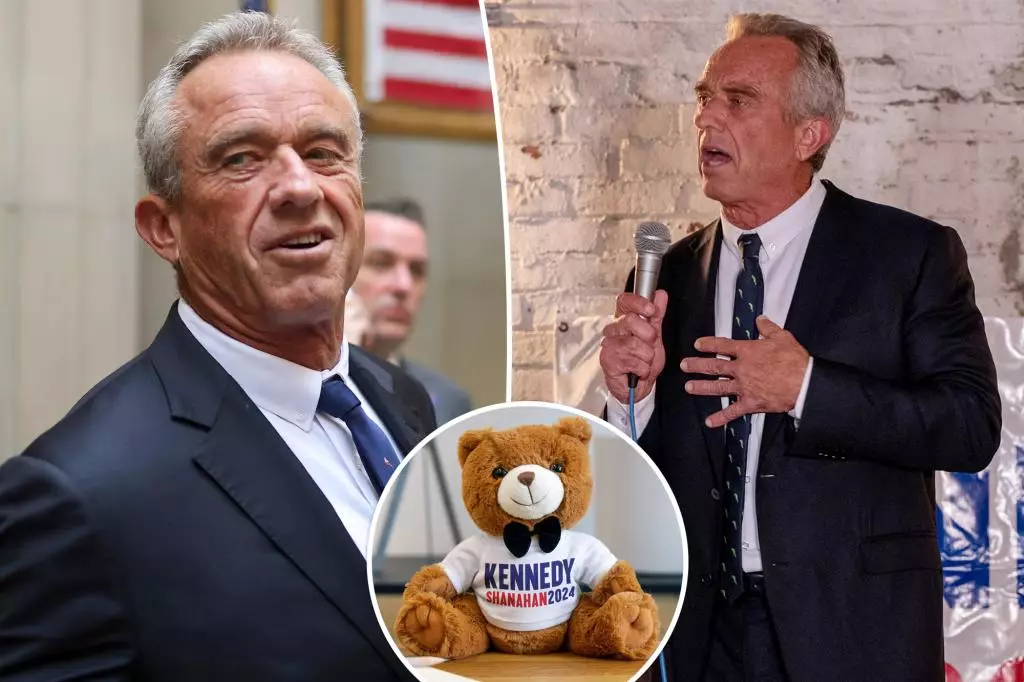Robert F. Kennedy Jr. has become a focal point of both admiration and disdain within American politics, his personal life interwoven with political aspirations that appear increasingly fraught with turmoil. Recent reports surrounding his alleged affairs and a sexting scandal have led to intense media scrutiny. Yet, despite these challenges, sources close to Kennedy suggest that his political resolve remains unwavering. He apparently sees himself as a figure engaged in a righteous battle, asserting that his mission transcends the gossip and strife that characterize his personal dealings.
Kennedy’s determination to maintain his political ambitions, even in the face of scandal, reveals an intriguing aspect of his personality: a belief in his divine mandate. This notion gives his political stance an almost messianic quality, implying that the difficulties he faces are merely hurdles in a greater quest for advocacy. The paradox lies in the juxtaposition between his commitment to political values and the personal upheaval that undermines his credibility. While he defends his actions, claiming they are in service of a larger cause, the reality may indicate a hazardous conflation of personal interests with public service.
The political choices Kennedy has made have reverberated through his familial relationships, leading to significant rifts. His recent endorsement of Donald Trump in August galvanized a public reaction from various family members, highlighting a stark contrast between his values and those espoused by his lineage. The fallout has become not just personal, but also emblematic of broader ideological divides within the Democratic party and the Kennedy name itself.
Kennedy’s family released a poignant statement condemning his endorsement, expressing disappointment and framing his decision as a betrayal of the principles that the Kennedy lineage has historically stood for. The family’s collective statement underscores the emotional weight of political affiliations and exposes the deep schisms that can arise even in the face of shared ancestry. While Kennedy seeks to carve out a niche for himself within the political landscape, he is simultaneously alienating those who might have once stood with him.
The juxtaposition of individual political identity against familial loyalty raises essential questions about political dynamics and the stakes involved in breaking from tradition. In this case, it isn’t just about Kennedy’s choice to endorse Trump; it represents an ideological schism that has left family ties frayed.
As if the political drama surrounding him wasn’t enough, Kennedy’s personal life has drawn scrutiny, particularly concerning his alleged romantic entanglements. Reports of a supposed affair with journalist Olivia Nuzzi amplify the complexities of his public persona. Though Kennedy denies these claims, the revelation of intimate communications—however non-physical—interlaces the realms of his personal and political lives, creating an intricate narrative that captures public interest.
The potential ramifications on his personal life are significant, especially considering the reported feelings of frustration and betrayal expressed by his wife, actress Cheryl Hines. As a lifelong Democrat, Hines’ discontent with Kennedy’s political maneuverings further complicates the narrative. Their relationship is caught in a whirlwind of conflicts stemming from both external pressures and internal discord regarding political alignment and public perception.
The examination of Kennedy’s relationships reveals a broader commentary on the challenges faced by public figures navigating personal integrity while under the relentless gaze of the media and political adversaries. In a world where every misstep is exacerbated by public consumption, the balancing act becomes increasingly difficult. The personal, it seems, is irrevocably intertwined with the political; neither can be neatly compartmentalized.
As RFK Jr. continues his journey through the turbulent landscape of American politics, the narratives generated by both his personal and public life will undoubtedly play crucial roles in shaping his future. While his sincere belief in a greater cause may drive him onward, the very scandals that threaten to undermine him also serve as powerful tools for critique from both allies and adversaries.
The unfolding saga offers a rich tapestry of insights into the nature of political identity, familial loyalty, and the complexities of romantic entanglement—all set against the backdrop of a deeply divided political climate. For Kennedy, the path ahead is uncertain, fraught with the potential for both redemption and further disintegration. Nonetheless, he remains steadfast in his mission, determined to leave a mark despite the storms surrounding him. Ultimately, how this multifaceted narrative concludes may depend on his ability to reconcile these competing forces within his life.


Leave a Reply